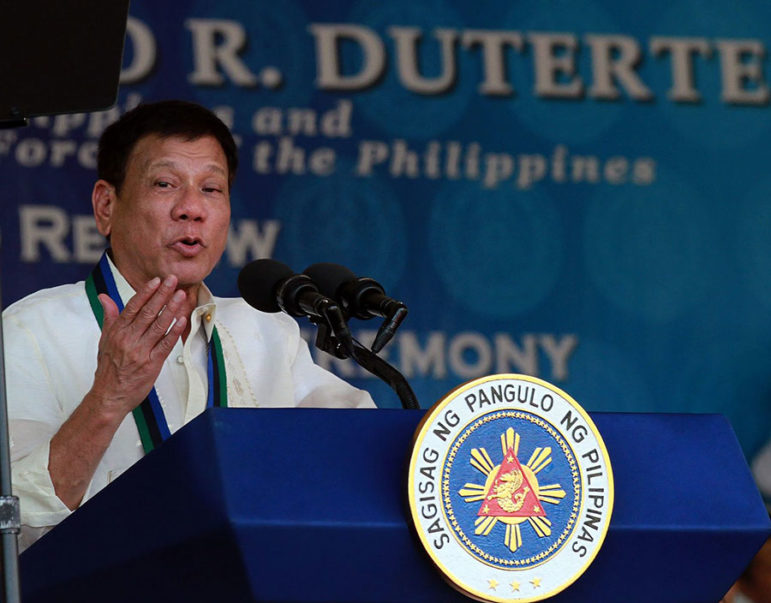
Rodrigo “Rody” Roa Duterte, is the 16th and most recently elected president of the Philippines. Duterte was a prosecutor for Davao City before becoming mayor of the city during the Philippine Revolution of 1986. The success of Duterte’s seven terms (more than 22 years) in office are said to be primarily the result of his extrajudicial killing of drug users and criminals. It appears that he intends to bring the same brutal message and methodology to rest of the country that elected him.
“Hitler massacred three million Jews,” Mr. Duterte said after returning to the Philippines from a trip to Vietnam, understating the toll cited by historians, which is six million. “Now, there is three million, there’s three million drug addicts. There are. I’d be happy to slaughter them.” Killing that number of drug users would “finish the problem of my country and save the next generation from perdition,” he said. Since Mr. Duterte took office in June promising a grisly campaign against crime and drugs, the Philippines has seen a surge in killings of drug suspects.
In September, in a hearing in the Philippines Senate investigating the extrajudicial killings of more than 3,000 suspected drug users (and a public official critical of Duterte) since he took office in June, a witness accused Duterte of paying a team of hit men to carry out the summary executions.
During his presidential campaign, which Duterte won by a significant margin, he warned that the Philippines should build funeral parlors rather than prisons for drug pushers and that the criminals themselves should either flee the country or commit suicide rather than face his wrath.
Human Rights Watch began its 2009 report on Duterte’s death squad operations with this quote from his days as mayor of Davao: “If you are doing an illegal activity in my city, if you are a criminal or part of a syndicate that preys on the innocent people of the city, for as long as I am the mayor, you are a legitimate target of assassination.” The report claims that Duterte brazenly had some victims assassinated after announcing their names on local television.
Sign up for our free newsletters
Subscribe to NPQ's newsletters to have our top stories delivered directly to your inbox.
By signing up, you agree to our privacy policy and terms of use, and to receive messages from NPQ and our partners.
Will Duterte’s strongman tactics prevail in a country of 100 million citizens that has an aggressive press and a vibrant civil society? The recent Senate hearings indicate that the country’s checks and balances are at work. Will they work? And what about the international community? When the UN Secretary-General Ban Ki-moon condemned Duterte’s endorsement of extrajudicial killings last August, Duterte simply threatened to pull out of the United Nations in a vulgar tirade.
And what about relations between the U.S. and its former colony, now a major non-NATO ally? A few weeks ago, Duterte called President Obama a “son of a whore.” Duterte recently announced that “the countries’ coming joint military exercises would be their last.” During a visit to Vietnam, Duterte said he had received information that “the CIA is planning to kill me.” Does Duterte deserve the contempt of the U.S for his promotion of human rights violations in the name of ideological fervor? A spokesperson for the US embassy recently said that the United States would continue to work with the Philippines to “uphold our shared democratic values.”
What shaped Duterte’s “values” was the raging Communist insurgency in the Philippines when Dutere first took office as mayor of Davao in the early 1980s. Writing for the Atlantic, Sheila Coronel offers a glimpse into Duterte’s convulsed world.
Unless you saw the madness with your own eyes, it was hard to believe. On one trip to Davao, I found a city terrorized by bands of vigilantes, roaming the streets with guns or long knives, hunting for communists. The radio blared anti-communist tirades, the most incendiary of them from Jun Pala, a broadcaster who compared himself to Goebbels. Pala walked around Davao armed with a Magnum revolver and a hand grenade. On air, he threatened to behead rebel sympathizers and egged on the vigilantes as they gunned down or knifed suspected communists. One day, news photographers chanced upon a vigilante band that had beheaded a suspected guerrilla. The killers posed for pictures, and said they drank the blood from the sundered head.
Today, Duterte is the popularly elected president of his country and a “world leader.”—James Schaffer













